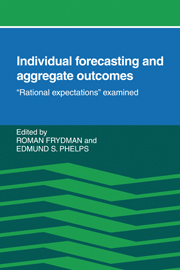Book contents
- Frontmatter
- Contents
- List of contributors
- Preface
- 1 Introduction
- 2 The trouble with “rational expectations” and the problem of inflation stabilization
- 3 Expectations of others' expectations and the transitional nonneutrality of fully believed systematic monetary policy
- 4 The stability of rational expectations in macroeconomic models
- 5 Individual rationality, decentralization, and the rational expectations hypothesis
- 6 Convergence to rational expectations equilibrium
- 7 A distinction between the unconditional expectational equilibrium and the rational expectations equilibrium
- 8 On mistaken beliefs and resultant equilibria
- 9 Equilibrium theory with learning and disparate expectations: some issues and methods
- 10 Keynesianism, monetarism, and rational expectations: some reflections and conjectures
- Index
1 - Introduction
Published online by Cambridge University Press: 05 June 2012
- Frontmatter
- Contents
- List of contributors
- Preface
- 1 Introduction
- 2 The trouble with “rational expectations” and the problem of inflation stabilization
- 3 Expectations of others' expectations and the transitional nonneutrality of fully believed systematic monetary policy
- 4 The stability of rational expectations in macroeconomic models
- 5 Individual rationality, decentralization, and the rational expectations hypothesis
- 6 Convergence to rational expectations equilibrium
- 7 A distinction between the unconditional expectational equilibrium and the rational expectations equilibrium
- 8 On mistaken beliefs and resultant equilibria
- 9 Equilibrium theory with learning and disparate expectations: some issues and methods
- 10 Keynesianism, monetarism, and rational expectations: some reflections and conjectures
- Index
Summary
Understanding the formation of individual expectations and the roles of information and knowledge in economic decisions has long been one of the most difficult and important problems in economics. Until the recent rational expectations movement, it was widely thought that expectations behavior contained psychological and sociological elements and hence could not be modeled with only the tools of individualistic optimization calculus and statistical decision theory.
Modern thought on expectations modeling
Knight, in his classic book, introduced the distinction between measurable uncertainty – which he called “risk” – and “true uncertainty,” which cannot “by any method be reduced to an objective, quantitatively determined probability” (Knight, 1921, p. 321). For Knight, the uncertainty of events arises from their uniqueness:
Business decisions… deal with situations which are far too unique… for any sort of statistical tabulations to have any value for guidance. The conception of an objectively measurable probability or chance is simply inapplicable
[Knight, 1921, pp. 231–2].But there is some regularity in economic life. Although Knight's insistence on the unique aspects of each situation cannot be neglected, economics must also recognize the recurring elements. It must do so if it is to aspire to any explanatory power.
Keynes, too, spoke of uncertainty. Unique developments over the future – parameter shifts, in modern terms – make it impossible to assign an objective probability distribution to distant future states. In fact, Keynes noted that “[not] all probabilities are measurable” (Keynes, 1921, p. 34), because it is not generally possible to enumerate all possible states of the world (thus foreshadowing a problem for contract theory!).
Information
- Type
- Chapter
- Information
- Individual Forecasting and Aggregate Outcomes'Rational Expectations' Examined, pp. 1 - 30Publisher: Cambridge University PressPrint publication year: 1984
